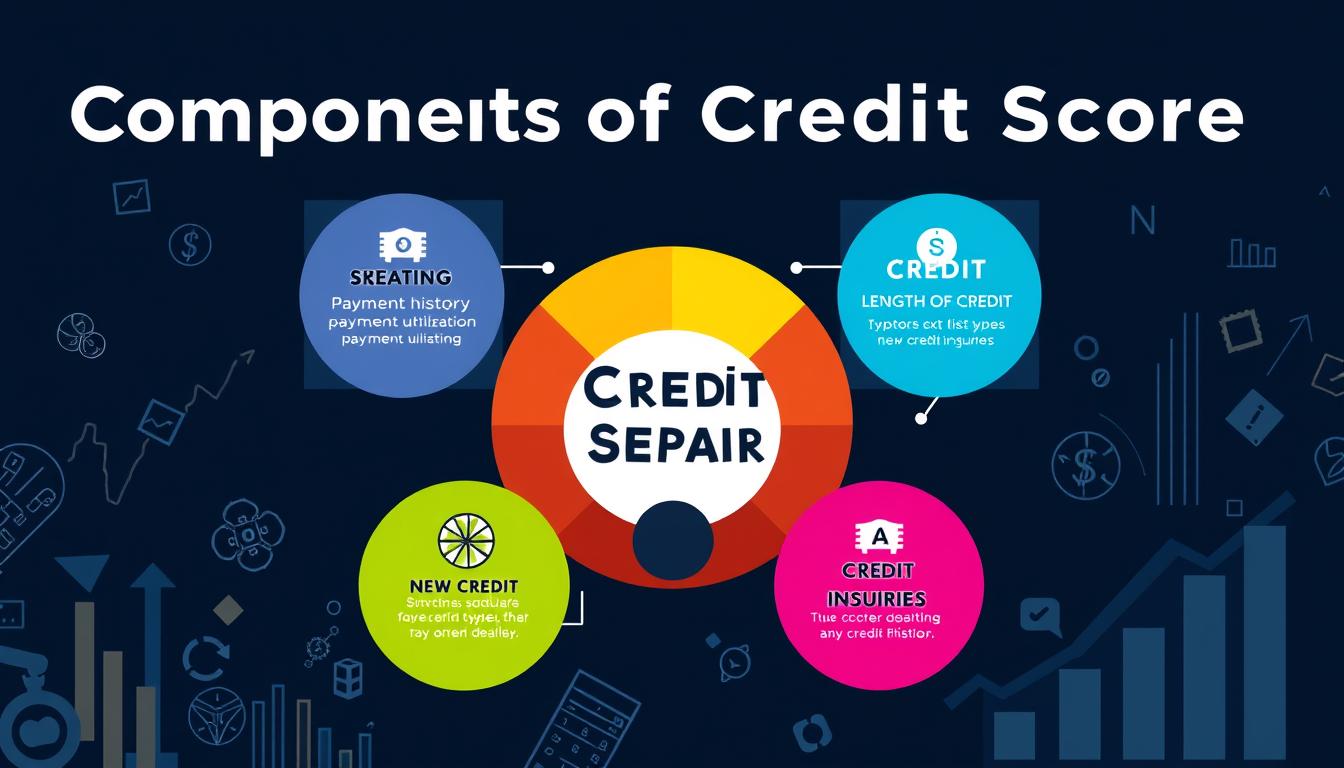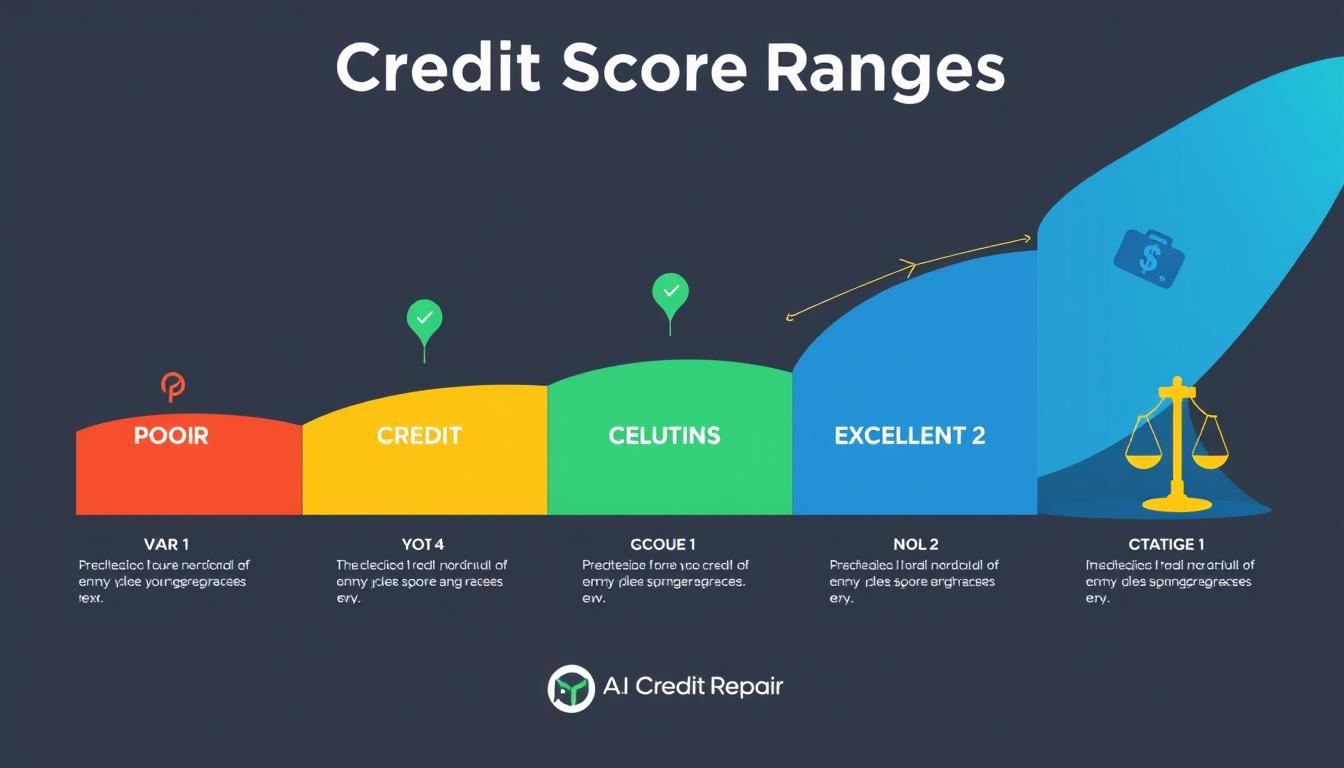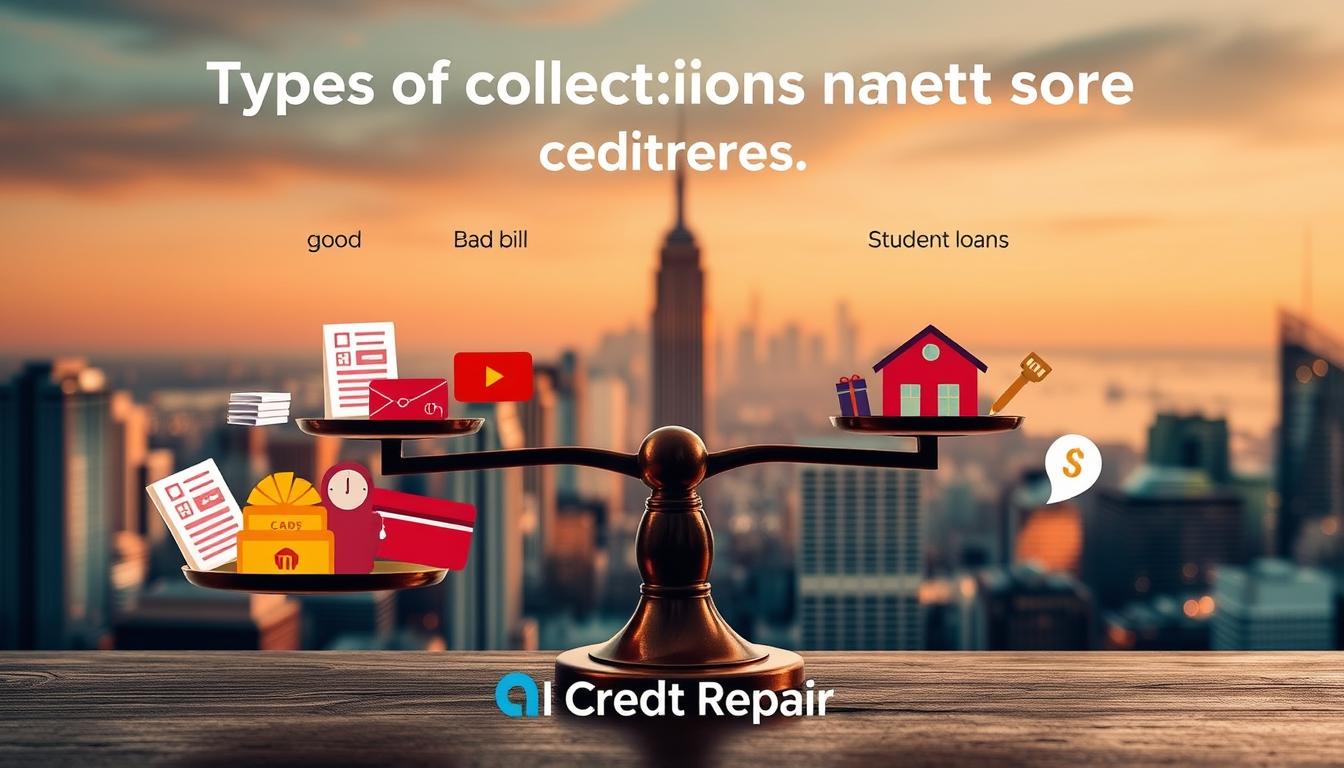Your credit score plays a crucial role in your financial life. It affects loan approvals and interest rates. Collections on your credit report can significantly impact your score, potentially dropping it by hundreds of points.
We’ll examine credit scores, collection impacts, and ways to fix the damage. You’ll learn strategies to restore your credit and improve your financial standing.
Key Takeaways
- Collections can lower your credit score by as much as 100-150 points, depending on your overall credit profile.
- The impact of a collection on your credit score varies based on factors like the type of debt, the age of the collection, and your credit history.
- Negotiating with creditors, disputing inaccurate collections, and implementing responsible debt management practices can help mitigate the damage of collections on your credit score.
- Regularly monitoring your credit report and addressing any collections or errors promptly is crucial for maintaining a healthy credit score.
- Rebuilding your credit after a collection can be a gradual process, but it’s achievable with patience and disciplined financial habits.
Understanding Credit Scores and Collections
Your credit score shows how trustworthy you are with money. It’s based on your financial history and habits. This score is key for getting loans, credit cards, and even jobs.
What is a Credit Score?
A credit score is a number from 300 to 850. Higher scores mean less risk for lenders. Your score depends on payment history, credit use, and other factors.
The Impact of Collections on Credit Scores
Collections can really hurt your credit score. They happen when you don’t pay a debt and it goes to a collection agency. This can lower your score by 100 points or more.
Collections stay on your report for up to seven years. This makes it harder to get good deals on future credit. You might end up paying more in interest and fees.
| Credit Score Component | Percentage of Total Score |
|---|---|
| Payment History | 35% |
| Credit Utilization | 30% |
| Length of Credit History | 15% |
| Types of Credit Used | 10% |
| New Credit Inquiries | 10% |

Factors that Influence Credit Score Deductions
Collections on your credit report can significantly impact your score. The extent of the deduction varies based on several key factors. Understanding these variables helps determine how a collection affects your credit profile.
The type of debt in collection is a primary factor. Medical bill collections often have less impact than other debts. This is because lenders view medical debt as less indicative of overall creditworthiness.
The age of the collection also matters. Newer collections typically cause greater score deductions. Credit scoring models weigh recent negative information more heavily. Over time, a collection’s impact on your score may lessen.
The amount owed in collection influences the credit score impact. Larger unpaid debts tend to affect your score more significantly. Lenders may see bigger debts as a greater risk when evaluating creditworthiness.
| Factor | Impact on Credit Score Deduction |
|---|---|
| Type of Debt | Medical collections typically have a less severe impact than other types of debt |
| Age of Collection | Newer collections result in greater deductions than older ones |
| Amount Owed | Larger debts in collection lead to more significant credit score deductions |
Grasping these factors affecting credit score deductions helps assess a collection’s impact on your credit profile. This knowledge enables you to take steps to minimize potential damage to your creditworthiness.
How Many Points Does a Collection Lower Your Credit Score?
A collection can significantly impact your credit score, causing substantial point deductions. The impact varies based on your starting score and the collection’s nature.
Credit Score Ranges and Point Deductions
Higher credit scores face more dramatic point deductions from collections than lower scores. An excellent score of 800+ might drop by 100 points or more.
A fair credit score of 650 might only decrease by 60-80 points. Credit scoring models make higher scores more fragile to negative information.
Lower credit scores are more resilient. The impact of a collection is relatively less severe for these scores.
| Credit Score Range | Potential Point Deduction from a Collection |
|---|---|
| 800+ | 100+ points |
| 700-799 | 80-120 points |
| 600-699 | 60-100 points |
| 500-599 | 40-80 points |
| 400-499 | 20-60 points |
The impact of a collection depends on factors like debt type and age. Your overall credit profile also plays a role.
Regularly check your credit report to spot any issues. Address collections promptly to minimize damage to your credit score.

Types of Collections and Their Impact
Collections can harm your credit score, but their impact varies. The type of debt matters. Some collections hurt more than others.
Understanding these differences helps manage your creditworthiness. Let’s explore how various collections affect your credit score.
Medical Collections vs. Other Debt Collections
Medical collections often have a milder impact on credit scores. Lenders and credit models view them differently than other debts.
They see medical debt as unavoidable, not irresponsible. This view leads to less severe penalties for consumers.
Other collections, like credit card or utility debts, usually cause more damage. These are seen as signs of poor financial management.
| Collection Type | Typical Credit Score Impact |
|---|---|
| Medical Collections | Less severe than other debt collections |
| Other Debt Collections (credit cards, loans, utilities) | More severe credit score deductions |
Remember, all collections can hurt your credit score. The exact impact depends on your credit history and scoring model used.
Knowing how different collections affect you helps protect your creditworthiness. Stay informed to manage your credit effectively.

Mitigating the Damage of Collections
Collections on your credit report can hurt your credit score. But don’t worry! You can take steps to reduce the damage and protect your creditworthiness.
Try negotiating with the creditor. Contact the collection agency or original creditor to reach a settlement. They might remove the collection from your report if you agree to a payment plan.
Dispute any inaccurate collections on your credit report. Look for errors in the collection information. If you find any, file a dispute with the credit bureaus.
Managing your existing debt helps minimize long-term impact on your credit score. Make timely payments and create a budget. Prioritize debt repayment to avoid future collections.
| Strategy | Benefits |
|---|---|
| Negotiate with Creditors | Potential removal of collection from credit report, reduced payment amount |
| Dispute Inaccurate Collections | Removal of erroneous information, improved credit report accuracy |
| Responsible Debt Management | Prevent future collections, maintain good credit health |
Using these strategies can help reduce the impact of collections on your credit score. Take action to manage your collections and protect your credit score for the future.

“Addressing collections head-on is crucial for rebuilding your credit and financial well-being.”
Strategies for Removing Collections
Collections can hurt your credit score. But there are ways to remove them. Let’s explore negotiating with creditors and disputing inaccurate collections.
Negotiating with Creditors
Talking to creditors can help resolve collections. You might reach a deal that improves your credit score. This could mean paying a lump sum or setting up a payment plan.
Be ready to show your financial situation. Propose a fair solution. Creditors often want to recover some of the debt.
Disputing Inaccurate Collections
If a collection is wrong, you can dispute it. Check your credit report carefully. Gather proof that shows the collection is incorrect.
Follow the right steps to challenge the collection. Contact both credit bureaus and the collection agency. Credit bureaus must investigate and remove any wrong information.
Negotiating with creditors and disputing inaccurate collections are powerful tools. They can help improve your credit score. Take action now for a better financial future.
Credit Restoration After Collections
Collections can hurt your credit score badly. But don’t worry! You can fix your credit with some smart moves. Let’s explore how to rebuild your credit after collections.
Start by paying off any outstanding debts. This shows lenders you’re serious about money management. It also boosts your credit utilization ratio, which affects your score.
Try negotiating with creditors to remove collection items from your report. This can speed up your credit recovery process.
Opening new credit accounts is another good strategy. Consider getting a secured credit card. You could also become an authorized user on someone’s account with good payment history.
These actions help rebuild your credit history. They show you can handle credit responsibly.
- Monitor your credit report regularly and dispute any inaccuracies or errors.
- Utilize credit-building tools, such as credit-monitoring services, to track your progress and identify areas for improvement.
- Maintain good financial habits, including on-time payments and low credit utilization, to continue strengthening your credit profile.
Patience and determination are key in credit restoration strategies. With time, you can rebuild your credit after collections. Take charge of your finances today for a brighter credit future.
| Credit Rebuilding Strategies | Impact on Credit Score |
|---|---|
| Pay off outstanding debts | Improves credit utilization ratio |
| Negotiate with creditors to remove collections | Reduces negative items on credit report |
| Establish new credit accounts | Builds credit history and diversifies credit mix |
| Monitor credit report and dispute inaccuracies | Ensures accurate credit information |
Preventing Future Collections
Avoiding future collections is vital for a strong credit profile. Responsible debt management is key to preventing collections. Stay on top of your finances and communicate with creditors to minimize risks.
Responsible Debt Management Practices
Create and stick to a budget. Pay all bills on time, including credit cards, loans, and utilities. If you’re struggling, talk to creditors about alternative payment plans.
Check your credit report often for errors or issues. Dispute any collections or mistakes you find right away. Get them removed from your credit report quickly.
Be proactive in managing your finances. This approach can help prevent future collections from hurting your credit score. Stay vigilant and take action to protect your financial health.

